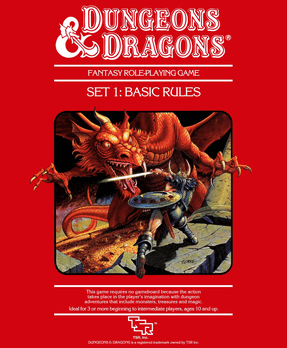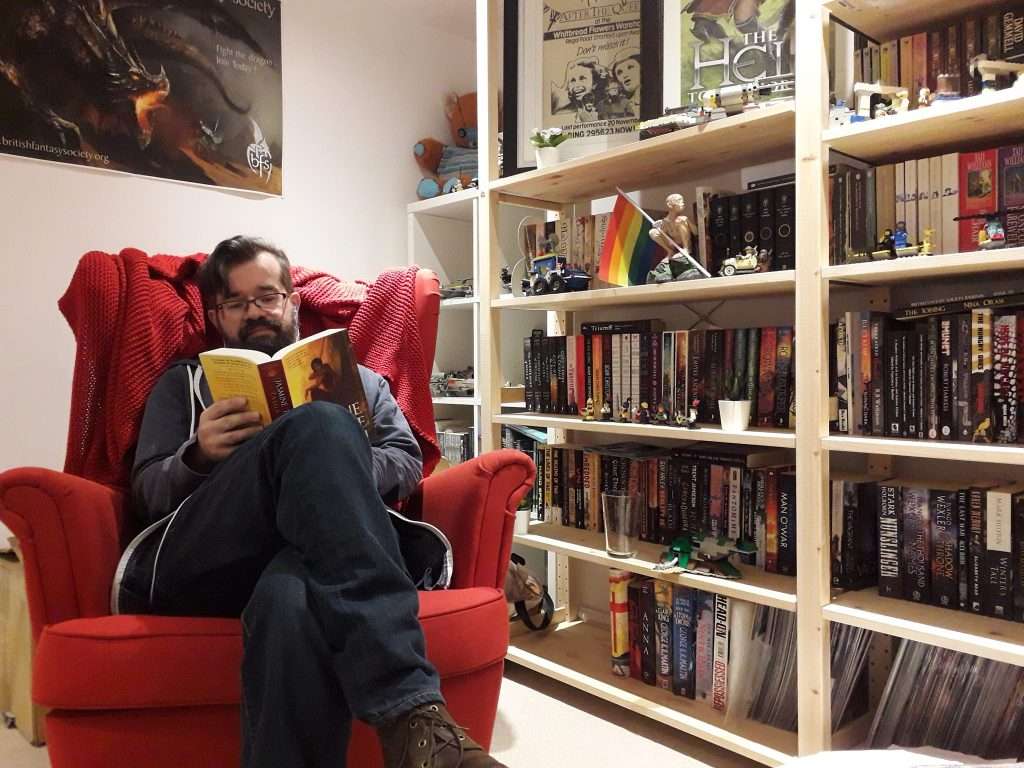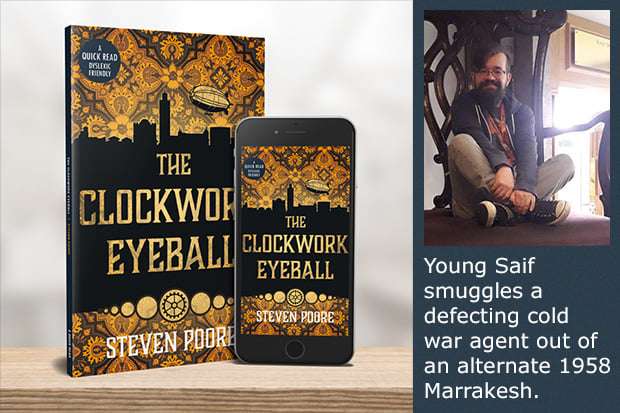We’d love to shine a light on the volunteers who help keep the British Fantasy Society running—this month, we meet the lead judge for the annual BFS short story competition, Steven Poore, who is eagerly awaiting your entries!

Name, including preferred pronouns
Steven Poore (he/him)
Which region are you based in?
Sheffield, South Yorkshire
Your role on the BFS committee is:
Lead Judge, Short Story Competition
Are you drawn to any specific sub-genres?Â
I’m an Epic Fantasist!
If you write, which genre:Â
I’m an Epic Fantasist at heart! But when I’ve turned to short fiction, it can go anywhere: hairy walls, possessed self-service checkouts, very bad puns. Basically, shaggy dog stories! Having envied for years anyone who can write tie-in/IP fiction (I’ve never quite got my head around the mass of Lore that is WH40K), I’m finally chipping away at that too.
Your work with the BFS
Why did you join the BFS committee?
I had expressed an interest in helping with the competition when Allen Ashley moved on from the role—I saw it as a way of giving back and learning a bit more about short stories. After the first year, working with Shona and the Glass Slipper podcast folks, I put myself forward as lead judge—and to my surprise I’m still here!
Tell us more about your role: what do you do?Â
For me the nuts and bolts of running the Short Story Competition are to ensure that every entry gets a fair shout, and that the entries should come from as broad a field as possible. Making it fair means that we read “blindâ€, stripping away identifying information. I have two spreadsheets, one with names, one without, and the other judges only see the latter sheet. Once all the entries are in, I read randomly and my busy head means I can never remember who sent what anyway. After that we confer and argue over a shortlist, and whittle that down to a final three, and the winners are announced at the British Fantasy Awards at Fantasycon.
What does this mean in practical terms for members?
There’s a long-term aim behind the competition. My personal belief is that it should be a more prestigious thing: something that winners should rightly be proud of, their stories being noted and reprinted elsewhere. In previous years the winning entries have been published in BFS Horizons, but Horizons has only been available to the society’s membership. The committee is now making Horizons publicly available, which means a wider readership for the winning stories, and hopefully getting them noticed by editors elsewhere. That may take some time, but we want both the stories and the competition to be prized in the genre!
Why should others get more involved with the BFS?
I’d argue, why wouldn’t you? And you don’t have to be a member of the committee to be involved. We’re all fans, we all want to shout about what we love, we all want to talk to like-minded people—you can just write a review, or volunteer to be on one of the awards juries, or join in with the online events. If you’re a member, it’s your society: you’re a part of what can move it and shape it.
Your influences
Tell us about the book/film/thing that got you into SFFH: What was it? How old were you? What impact did it have on you?
My parents took me to the Regal in Leamington Spa one evening in 1977 (I like to believe it was 1977, but I do know the Regal didn’t get Star Wars until April ‘78). Cue Fox fanfare and that text crawl… I never recovered. After that, around 1985, they bought me the D&D Basic Set. Heaven knows what they were thinking. Oh, and then there was an uncle who emigrated to Johannesburg and left all his books with us. Asimov, Aldiss, Gordon R Dickson, Moorcock, Eddings and Feist and Donaldson and more…Â

How does that early influence show up in your work now?
Looking back at Heir to the North and The High King’s Vengeance (OMG they were ten years ago now – holy heck, what am I doing?) they were all about the quest adventures I grew up on, and the sort of deep worldbuilding lore that would be scattered through the books as clues and signposts. Except that I wanted the quest to go badly wrong. I’m definitely still exploring the past though…Â
Where do you draw your creative inspiration from?
…so for example The Fey Lock riffs very heavily on the sort of holidays we used to have as a family in the 1980s—although I’m certain our hired narrowboats never crossed through to fairyland! Other inspiration is very random: one story grew from a jokey quip in B&Q, another from Homes Under the Hammer. Sometimes these things take far too long to gestate.

Who do you look to as a genre hero? Why?
I’m a total fanboy. Everybody is a hero to me. You published a book? And you’re talking to me? I love you.
I’m never going to forget meeting Terry Pratchett. For context, I’d directed an amateur stage version of Wyrd Sisters a year prior to that, and he looked up and said: “Ah. I was expecting somebody taller.â€
Your work
You’re stuck in an elevator for 60 seconds with that hero, and they want you to describe your work. Give us the pitch.
[incoherent internal screaming intensifies]
What are you working on right now?
Specifically, I’m working on trying to motivate myself out of a slough of despond. The last few years haven’t been easy to work through, and as I work full-time and act as a primary carer outside that, I’ve not done a lot of writing. I reckon it’s the same for a lot of people at the moment. With that said, I have The Fey Lock out on submission, and I’ve had fun working up a story set in the universe of the Traveller RPG—it stars the canine Vargr aliens, so it really is one of my shaggy dog stories.
Thinking about all of your stories/work you’ve done, which one sticks out most in your mind? Why?
You’d think it’d be The Fey Lock since I’ve been working on that on and off since god knows when, but it’s actually the story Encumbrance (aka The Hairy House). Especially if the TV is on in the background and Homes Under The Hammer comes on. That one was fun to write: every so often I’d say to my partner “How about this?†and if she said “Ewwwwww!†it went right in.
If you’re a creator, where and when do you create?
I have a cellar, tanked out and converted into a library/working space. The cat refuses to come down here, so I never get distracted… other than by books.
What’s the best advice you’ve received about creativity?
Never think you’re no good, otherwise you’ll believe it.
I’m not great at taking advice. :/
The quickfire round
Sci-fi, fantasy or horror?
Yes.
Quiet or loud?
LOUD
Dark or light?
I need sunlight, but I live in the dark.
Strict lines or genre blend?
Blend everything.
Awards or bestseller?
I wish!

Fiction or non-fiction?
Fiction. But I do love some historical flavourings.
Poetry or prose?
Poetry goes over my head—but then at my height, most things do…

Plotter or pantser?
It’s more like the Blues Brothers: I know where I’m going, but the actual route? LOL nah.
Reading or listening?
Reading.
Notebook or computer?
Computer.
Favourite SFFH book of all time?
The Barbed Coil, by JV Jones. Best portal epic of them all.
Last book you read?
I’m reading through Lavie Tidhar’s Bookman Histories right now, as well as devouring Anna Smith Spark’s A Sword of Bronze and Ashes—oh my days.
Any SFFH author on auto-buy?
There’s a few. Anna Smith Spark. Adrian Tchaikovsky. Juliet E McKenna. Joanne Hall. RJ Barker, damn his chocolate limes. Premee Mohamed is elbowing her way onto that list.
The home stretch
What’s the best thing about being a SFFH writer?
In all honesty, it’s been so long since I actually finished anything that I rarely feel like a writer. But being part of a team, being part of a crew that cheers on other writers and celebrates their successes? That’s pretty cool.
Time to plug your stuff! Where can we find you and your work? What have you got coming up? Consider this your advertising space.
Unfortunately Grimbold Books has closed, which means that Heir to the North and The High King’s Vengeance are presently unavailable in print. You can, however, still find the audiobooks on Audible, narrated by the excellent Diana Croft. The Clockwork Eyeball—a short and pacy alt-Cold War thriller set in Marrakech—is available from Books On The Hill Press and can be ordered at all good bookstores!
And you can usually find me online as @stevenjpoore on most platforms.
Far more pertinently at the moment: the BFS Short Story Competition is open for entries until the end of June, and I want to read your words! Details over here.


